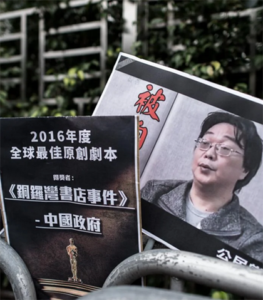Chinese dissidents fear refoulement from Thailand
Chinese dissidents sheltering in Thailand fear being returned to their homeland as the Thai Government steps up cooperation with Chinese law enforcement agencies.
Thailand has traditionally been a route for Chinese escaping repression at home but recent cases show they are increasingly at risk with Chinese police now working through Thai law enforcement agencies and also travelling to Thailand themselves, to try to find fleeing dissidents and take them back to China.
 Dissident Jian Xing escaped to Thailand in 2015 after volunteering for a Chinese civil rights website and speaking out about corruption in the local government.
Dissident Jian Xing escaped to Thailand in 2015 after volunteering for a Chinese civil rights website and speaking out about corruption in the local government.
Now settled in New Zealand, he has spoken of his experience last year when police officers came to his residence in Thailand and took away his belongings without a search warrant.
“They told me that they could kill me in Thailand, and nobody would even know,” Mr Xing told media.
Dissidents say the situation in Thailand has become so difficult that some of them are choosing to go back to China “voluntarily” under pressure from the Thai and Chinese governments.
Mr Xing’s incident caused panic among Chinese refugees stranded in Thailand.
Other refugees sent the video of police in Xing’s home to the United Nations High Commissioner for Refugees (UNHCR) to seek help.
By then, Xing had already been sent to an immigration detention center waiting to be repatriated to China. Eventually, he received emergency humanitarian assistance and was resettled in New Zealand.
Chinese artist Yong Hua, who fled Thailand in 2019, is making a documentary on the plight of Chinese refugees in Thailand waiting to relocate to third countries.
He says many people who have fled China to Thailand, and even among those who qualify for refugee status, are living in very difficult situations.
“I think they are suffering too much,” Mr Hua told the Voice of America.
“This suffering has two sides. The first one is economic, because you can’t work in Thailand. It’s illegal. Even if you get the refugee card, Thailand doesn’t recognize it. If your passport expired, you can get caught if you stay here. So, they are under a lot of financial pressure,” he said.
“Some people go to temples, to places that don’t charge them, because they have no money.”
Mr Hua said even worse is the second kind of suffering, the mental pressure.
“I think refugees all have severe or mild depression. They are not very healthy mentally,” he said.
Many refugees have been in Thailand for years waiting to be resettled, and their state of mind is very worrying.
Many of the people in China are Christians, Falun Gong practitioners and activists afraid of being followed by people from China.
Mr Hua has approached the US Embassy and the UNHCR to seek help and share his experience. He hopes to move to be able to move to the US.
He said he has received a refugee case number from the UNHCR but was told that his second interview would be held next year because there were few settlement places in third countries.












